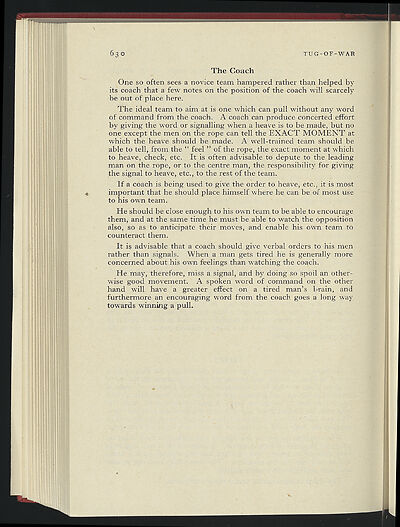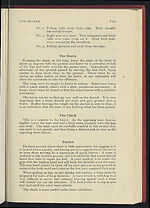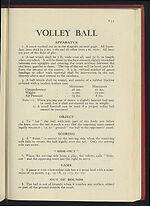1950-51
(660)
Download files
Complete book:
Individual page:
Thumbnail gallery: Grid view | List view

TUG-Or-WAR
The Coach
One so often sees a novice team hampered rather than helped by
its coach that a few notes on the position of the coach will scarcely
be out of place here.
The ideal team to aim at is one which can pull without any word
of command from the coach. A coach can produce concerted effort
by giving the word or signalling when a heave is to be made, but no
one except the men on the rope can tell the EXACT MOMENT at
which the heave should be made. Awell-trained team should be
able to tell, from the "feel " of the rope, the exact moment at which
to heave, check, etc. It is often advisable to depute to the leading
man on the rope, or to the centre man, the responsibility for giving
the signal to heave, etc., to the rest of the team.
If a coach is being used to give the order to heave, etc., it is most
important that he should place himself where he can be of most use
to his own team.
He should be close enough to his own team to be able to encourage
them, and at the same time he must be able to watch the opposition
also, so as to anticipate their moves, and enable his own team to
counteract them.
It
is
advisable that a coach should give verbal orders to his men
rather than signals. When a man gets tired he is generally more
concerned about his own feelings than watching the coach.
He may, therefore, miss a signal, and by doing so spoil an other-
wise good movement. A spoken word of command on the other
hand will have 'a greater effect on a tired man's brain, and
furthermore an encouraging word from the coach goes a long way
towards winning a pull.
6
3
0
The Coach
One so often sees a novice team hampered rather than helped by
its coach that a few notes on the position of the coach will scarcely
be out of place here.
The ideal team to aim at is one which can pull without any word
of command from the coach. A coach can produce concerted effort
by giving the word or signalling when a heave is to be made, but no
one except the men on the rope can tell the EXACT MOMENT at
which the heave should be made. Awell-trained team should be
able to tell, from the "feel " of the rope, the exact moment at which
to heave, check, etc. It is often advisable to depute to the leading
man on the rope, or to the centre man, the responsibility for giving
the signal to heave, etc., to the rest of the team.
If a coach is being used to give the order to heave, etc., it is most
important that he should place himself where he can be of most use
to his own team.
He should be close enough to his own team to be able to encourage
them, and at the same time he must be able to watch the opposition
also, so as to anticipate their moves, and enable his own team to
counteract them.
It
is
advisable that a coach should give verbal orders to his men
rather than signals. When a man gets tired he is generally more
concerned about his own feelings than watching the coach.
He may, therefore, miss a signal, and by doing so spoil an other-
wise good movement. A spoken word of command on the other
hand will have 'a greater effect on a tired man's brain, and
furthermore an encouraging word from the coach goes a long way
towards winning a pull.
6
3
0
Set display mode to:
![]() Universal Viewer |
Universal Viewer | ![]() Mirador |
Large image | Transcription
Mirador |
Large image | Transcription
| Games and sports in the army > 1950-51 > (660) |
|---|
| Permanent URL | https://digital.nls.uk/248816068 |
|---|
| Description | 'Games and Sports in the Army' was an annual publication produced by the British War Office between the 1930s and 1960s. This included the Second World War. It outlines the rules and regulations for games and sports played by members of the armed forces. It features names and photographs of team members, and examples of contemporary advertising. |
|---|---|
| Shelfmark | GWB.52 |

